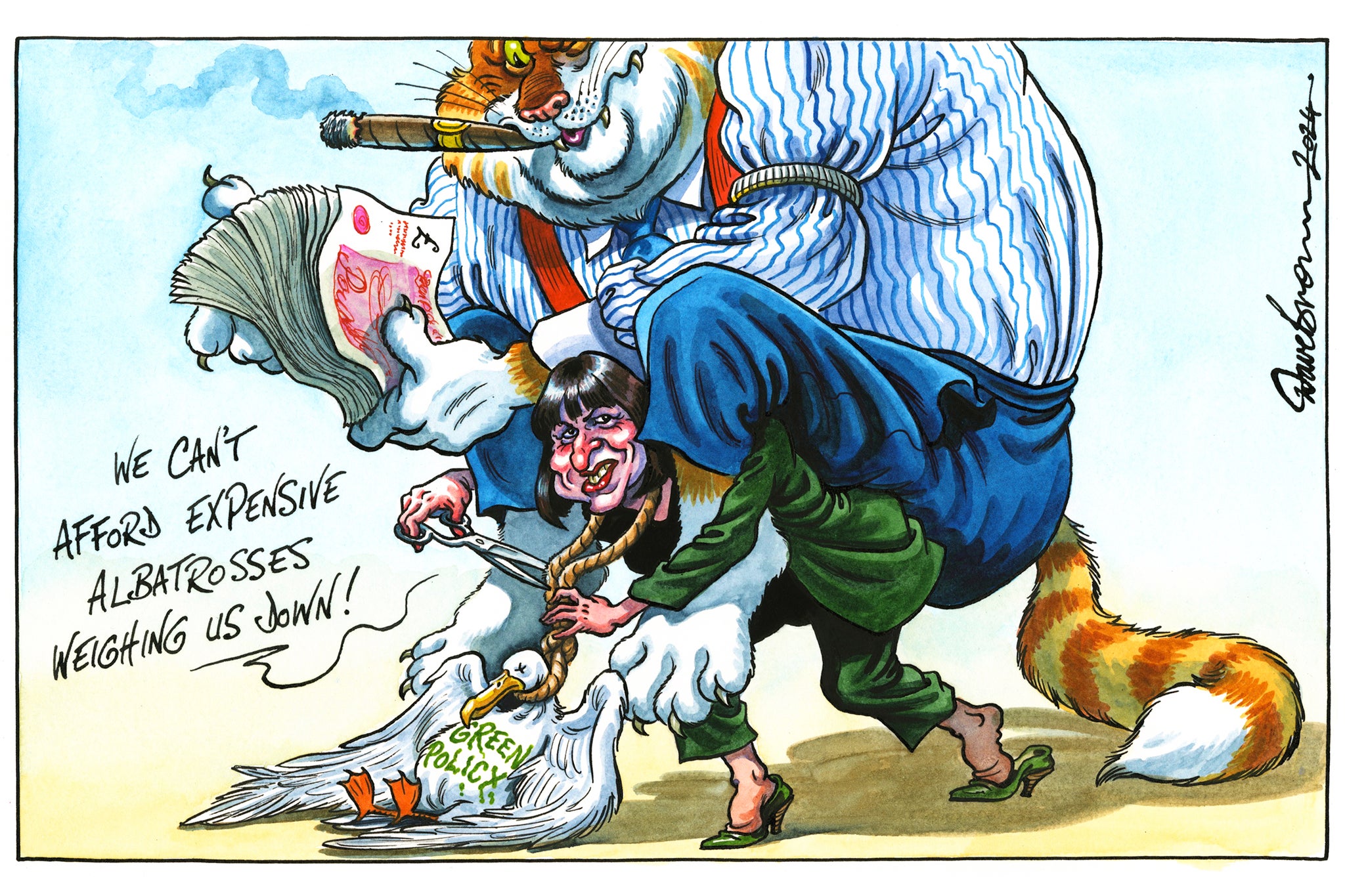The chancellor’s climbdown on tax cuts is unwelcome – and precarious for his party
Editorial: It might have been better if Jeremy Hunt hadn’t set people’s expectations so high. It also suggests that his recently implemented cut to national insurance might have been rash

One of the most irritating of soundbites, usually deployed when a politician finds themself in a tight spot and would rather not acknowledge the fact, is: “I’m not going to give a running commentary on X.” It’s been used often enough by the chancellor of the Exchequer, but in recent months Jeremy Hunt has been engaged in such a non-stop gabbling narrative about his fiscal plans you’d think he was doing it for charity. He has left his audience increasingly confused.
In effect, it echoes the persistent disarray in the Labour Party about the funding for its putative £28bn green deal, once central to its plan to boost growth, decarbonise the economy and cut fuel bills. Contrary to the rhetoric emanating from both main parties about their supposedly crystal clear plans and mission statements, the fact is that the electorate is faced with an unusually opaque choice less than a year before polling day.
Even where there is some semblance of precision about figures, such as the Conservatives’ plans for public spending, it turns out that, as the IMF says, the numbers are utterly unrealistic – which means that the entire fiscal plan is also for the birds. It is not reassuring, in that context, that Labour seems to be edging towards adopting the Treasury’s current spending projections.
As of his last public pronouncement, Mr Hunt is downplaying the prospect of tax cuts in his 6 March Budget. For those who’ve been paying attention, this comes as a bit of a surprise. It is only a few weeks since Mr Hunt was letting it be known that he was up for not one but two tax-cutting Budgets in 2024, with an assault on inheritance tax (albeit irrelevant to most) allied to some bold sweeps of the scimitar aimed at income tax, national insurance and business taxes.
Now, though, Mr Hunt confesses that “it doesn’t look to me like we will have the same scope for cutting taxes in the spring budget that we had in the autumn statement… and so I need to set people’s expectations about the scale of what I’m doing because people need to know that when a Conservative government cuts taxes we will do so in a responsible and sensible way. But we also want to be clear that the direction of travel we want to go in is to lighten the tax burden”.
It might have been better if Mr Hunt hadn’t set people’s expectations so high in the first place. It also suggests that Mr Hunt’s cut in national insurance, announced last November and recently implemented, might have been rash – it was, after all, something of a surprise given the previous phase when Mr Hunt was playing down the chances of tax cuts in 2024 at all.
Of course, economic circumstances can alter radically in the course of a few days, or even seconds – and geopolitical instability has added to all the usual uncertainties. Yet that is all the more reason for Mr Hunt to be more circumspect about his incessant spin about tax cuts. It can be doing him and the prime minister no good with nervous backbenchers in fear of losing their livelihood and having to retrain, as they so often tell the unemployed or people with disability, in a matter of months. It would be better if Mr Hunt said less and allowed himself to be judged on his actions.
Then again, that record isn’t encouraging either. The constant chatter about tax cuts as the “direction of travel” has obscured the more central fact that the burden of personal taxation has been substantially increased by the long-term freeze in income tax thresholds, or “fiscal drag” as the economists call it. Those real-term tax rises are five times bigger than the recent cut in national insurance and are projected to continue for years longer.
But despite their stealthiness, the public seems to be increasingly aware of the hikes in tax – and that they are being bamboozled. This is because they can feel and see the damage to their pay packets and their living standards, so they don’t believe a chancellor who tells them otherwise. Talk about tax cuts is being received with justified scepticism, as well it might.
The outlook for inflation and interest rates is more encouraging for Mr Hunt, and the Bank of England’s latest projections point to interest rate cuts later in the year, which would be just as welcome as tax cuts. But the commentary of the Bank also indicates still-sluggish growth, which is not an ideal background for a governing party seeking its fifth term of office.
Mr Hunt’s latest bit of spin also arrived with the news that, according to a cross-party select committee, many more local authorities are about to go bust, with all that entails for services and for council tax bills. Some, such as Birmingham and Nottingham, have already collapsed. It might be better, objectively speaking, if the money that may be earmarked for tax cuts was used instead to stabilise local councils and to stop council tax being ramped up in an atmosphere of crisis. The same goes for the many public services that are tangibly underfunded and under dangerous strain: these too are vote-losing for the Conservatives.
The imminent collapse of more local authorities means that the warnings issued by the IMF and the Institute for Fiscal Studies about the chancellor’s unrealistic public spending plans bear repeating – they are a fanciful source of tax cuts. Mr Hunt appears to agree with that analysis this week. But how will he feel next week?



Join our commenting forum
Join thought-provoking conversations, follow other Independent readers and see their replies
Comments